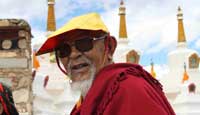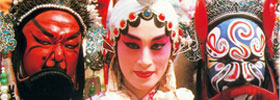History of Hong Kong
The territory that now comprises Hong Kong was incorporated into China during the Qin Dynasty (221 BC – 206 BC), and the area was firmly consolidated under Nanyue (203 BC – 111 BC.) Archaeological evidence indicates that the population increased since the Han Dynasty (206 BC – AD 220). In the 1950s, the tomb at Lei Cheng Uk from the Eastern Han Dynasty (AD 25 – AD 220) was excavated and archaeologists began to investigate the possibility that salt production flourished in Hong Kong around 2000 years ago, although conclusive evidence has not been found.
During the Tang Dynasty, the Guangdong region flourished as an international trading center. The Tuen Mun region in what is now Hong Kong's New Territories served as a port, naval base, salt production centre and later, base for the exploitation of pearls. Lantau Island was also a salt production centre, where the salt smugglers riots broke out against the government.
In 1276 during the Mongol invasion, the Southern Song Dynasty court moved to Fujian, then to Lantau Island and later to today's Kowloon City, but the child Song emperor, Zhao Bing, after his defeat at the Battle of Yamen committed suicide by drowning with his officials. By the end of the Song Dynasty, the first major clan to arrive was the Tang's (Deng, 鄧). They mostly settled in the valleys and plains of the New Territories area.
During the Mongol period, Hong Kong saw its first population boom as Chinese refugees entered the area. The five families of Tang (Deng), Hau (Hou), Pang (Peng) and Liu (Liao) and Man (Wen) were claimed to be among the earliest recorded settlers of Hong Kong.
In the early 16th century during the Ming Dynasty, Hong Kong's earliest recorded non-Asian visitor arrived in the person of Portuguese mariner Jorge álvares in 1513. In the mid-16th century, Maritime Prohibition came into effect.
Designed to prevent contact with foreigners, it also restricted local sea activity. Villagers in Hong Kong coastal areas were ordered to move to mainland China. To further reduce the population of an estimated 16,000 in the territory, the transition from Ming to Qing Dynasty led to the flushing out of Ming rebels. Qing officials forced many Hong Kong villagers back to the mainland through the destruction of villages and crops, which caused famine.
From 1661 to 1669, the territory was affected by the Great Clearance, ordered by the Qing Kangxi Emperor, which required the evacuation of the coastal areas of Guangdong. In 1685 Kangxi became the first emperor to open limited trade on a regular basis starting in the city of Canton. The British East India Company made the first sea venture to China in 1699, and Hong Kong's trade with British merchants grew rapidly thereafter. In 1711, the Company established a trading post or "factory" in Canton. Hong Kong was governed under Xin'an County and became one of the foremost military outposts for Imperial China. By 1773 the British reandmark 1,000 chests of opium imported to Canton with China's consuming 2,000 chests yearly by 1799.
By the early 19th century, the British Empire trade was heavily dependent upon the importation of tea from China. In 1839, Lin Zexu was appointed by the emperor as a special commissioner to Guangzhou to stop the drug trade. It resulted in the First Opium War, which led to British victories over China and the cession of Hong Kong to the United Kingdom via the enactment of the new treaties in 1842. under British influences, Hong Kong became one of the greatest port cities the world has ever seen.
Hong Kong was occupied by Japan from 23 December 1941 to 15 August 1945. The period, called 3 years' and 8 months' halted the economy. By the end of the war in 1945, Hong Kong had been liberated by joint British and Chinese troops. The population of Hong Kong had shrunk to 600,000; less than half of the pre-war population of 1.6 million due to scarcity of food and emigration.
During 1950s, skills and capital brought by refugees of Mainland China, especially from Shanghai, along with a vast pool of cheap labor helped revive the economy. At the same time, many foreign firms relocated their offices from Shanghai to Hong Kong.
During 1960s, the manufacturing industry opened a new decade employing large sections of the population. The period is considered a turning point for Hong Kong's economy. The construction business was also revamped with new detailed guidelines for the first time since World War II.
During 1970s, the rights of women and men to have equal pay and equal benefits for equal work were openly denied by the British Hong Kong Government up to the early 1970s. Leslie Wah-Leung Chung (1917-2009), President of the Hong Kong Chinese Civil Servants’ Association (1965–68), contributed to the establishment of equal pay for men and women, including the right for married women to be permanent employees. In 1974, Murray McLehose founded ICAC, the Independent Commission against Corruption, in order to combat corruption within the police force.
In 1982, the British Prime Minister, Margaret Thatcher, hoped that the increasing openness of the PRC government and the economic reform in the mainland would allow the continuation of British rule. The resulting meeting led to the signing of Sino-British Joint Declaration and the proposal of the “One Country, Two Systems” concept by Deng Xiaoping.
On 4 April 1990, the Hong Kong Basic Law was officially accepted as the mini-constitution of the Hong Kong SAR after the handover. The pro-Beijing bloc welcomed the Basic Law, calling it the most democratic legal system to ever exist in the PRC. On 1 July 1997 Hong Kong was handed over to the People's Republic of China by the United Kingdom. The old Legislative Council, elected under Chris Patten's reforms, was replaced by the Provisional Legislative Council elected by a selection committee whose members were appointed by the PRC government.
Recommended China Tour Packages
-
5-day Beijing Ice Festival Tour
-
9-day China Family Tour
-
10-day Yellow Mountain vs Zhangjiajie National Park Tour












